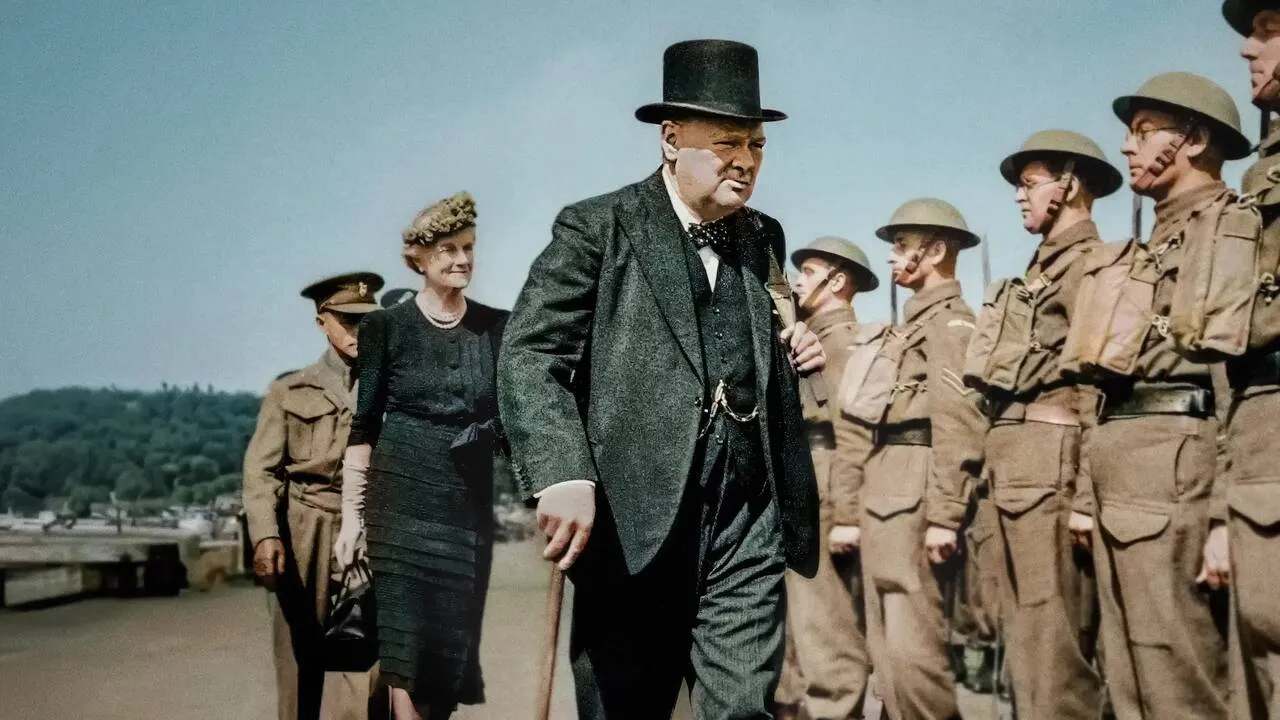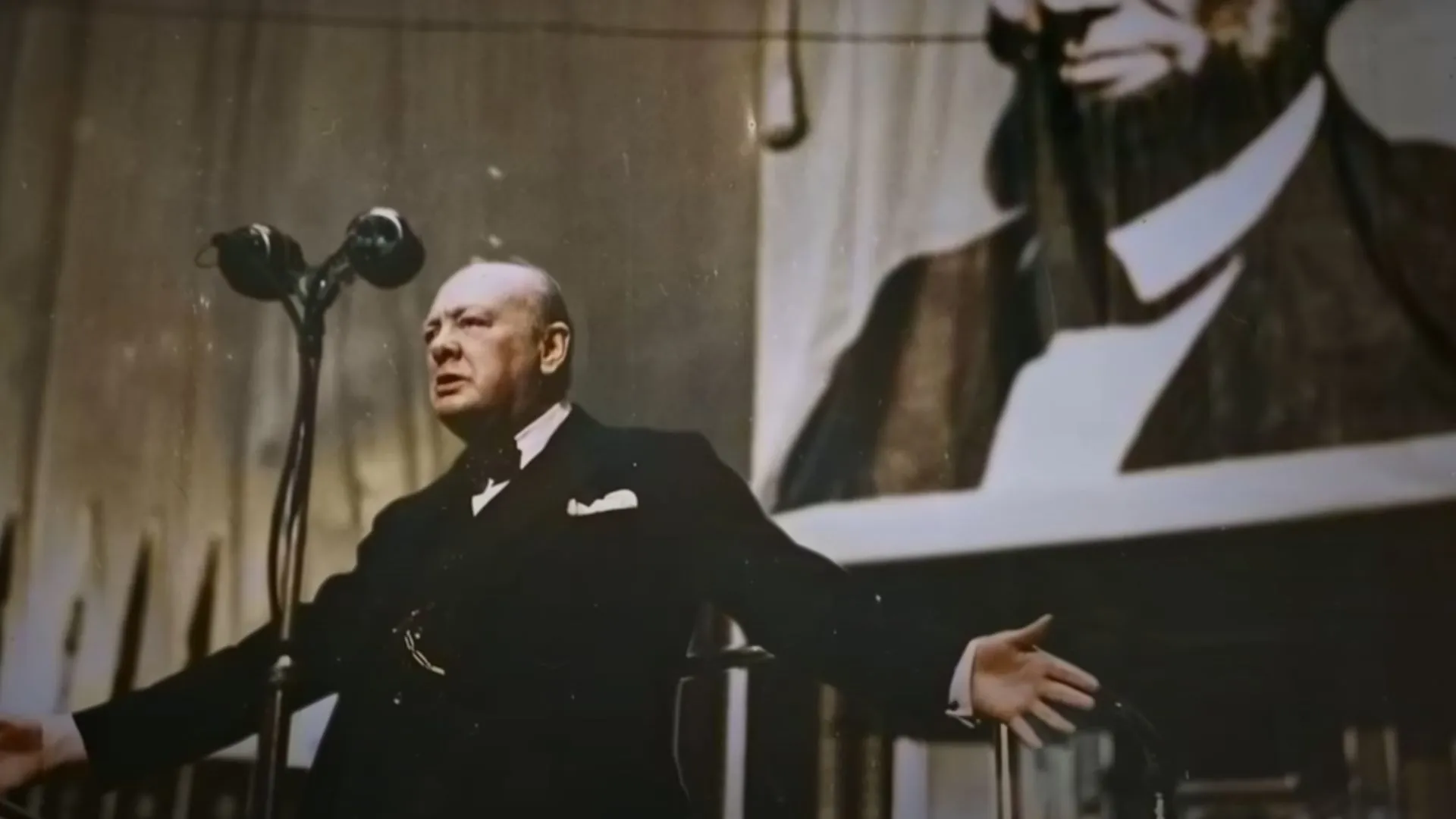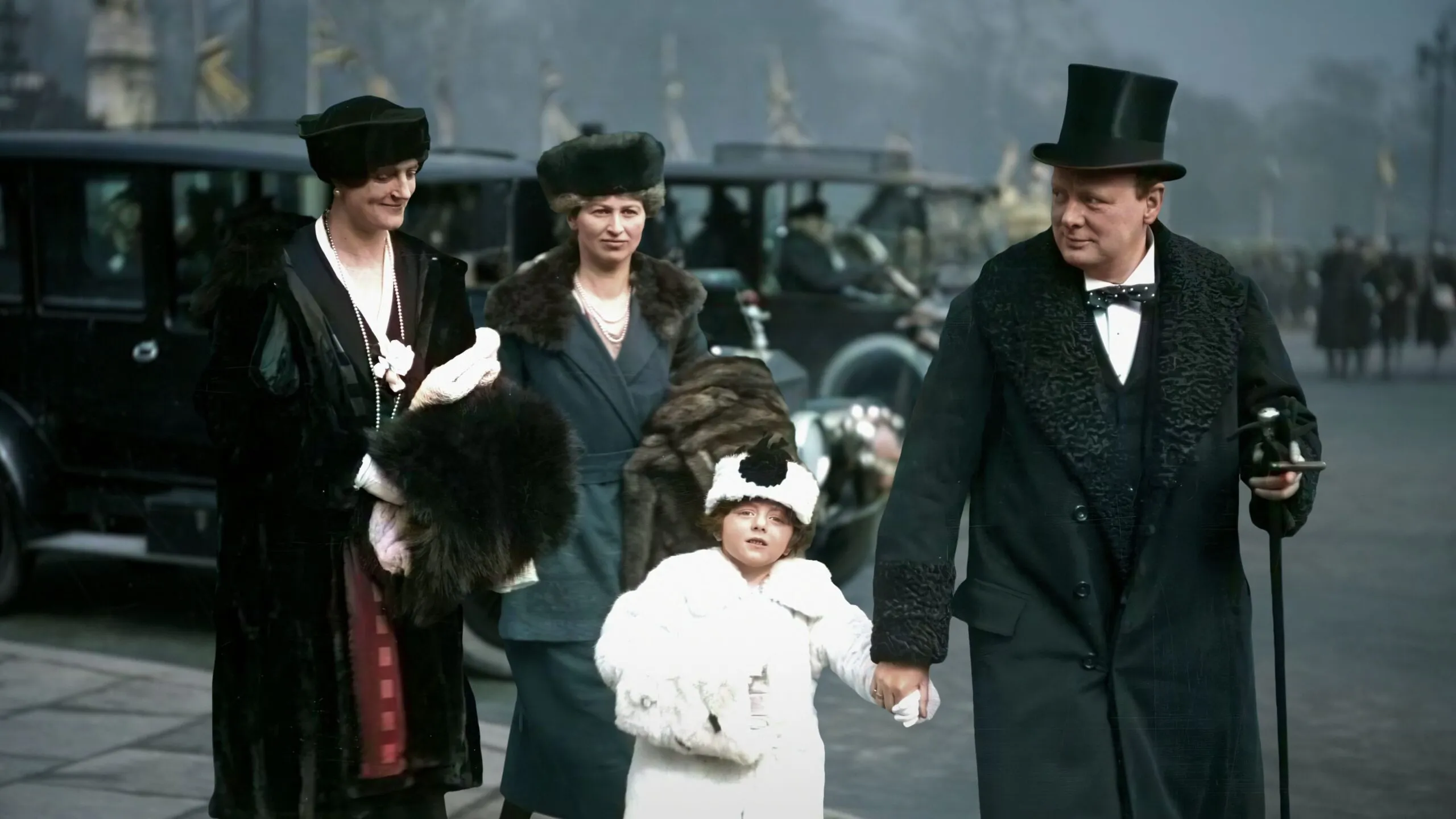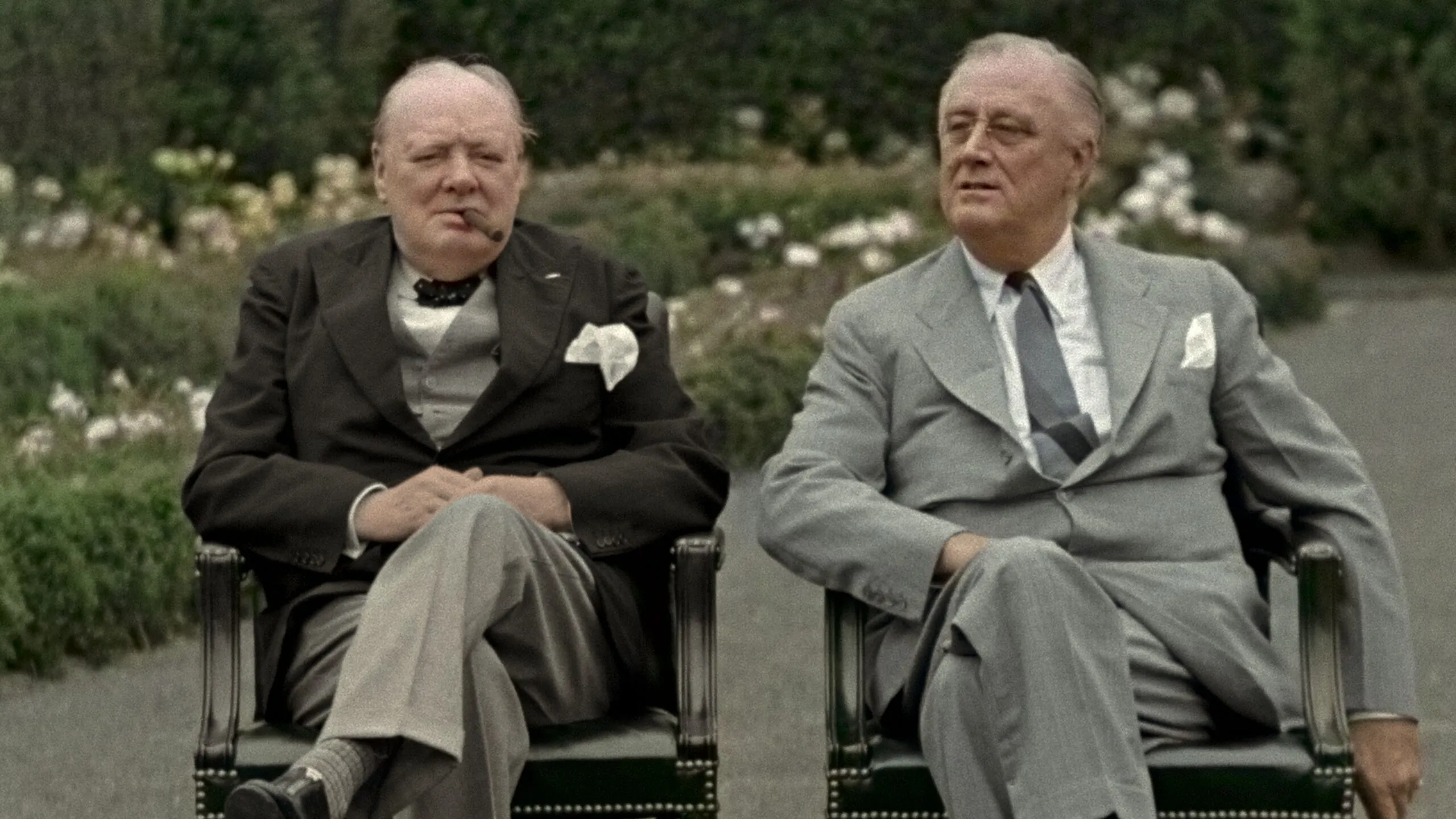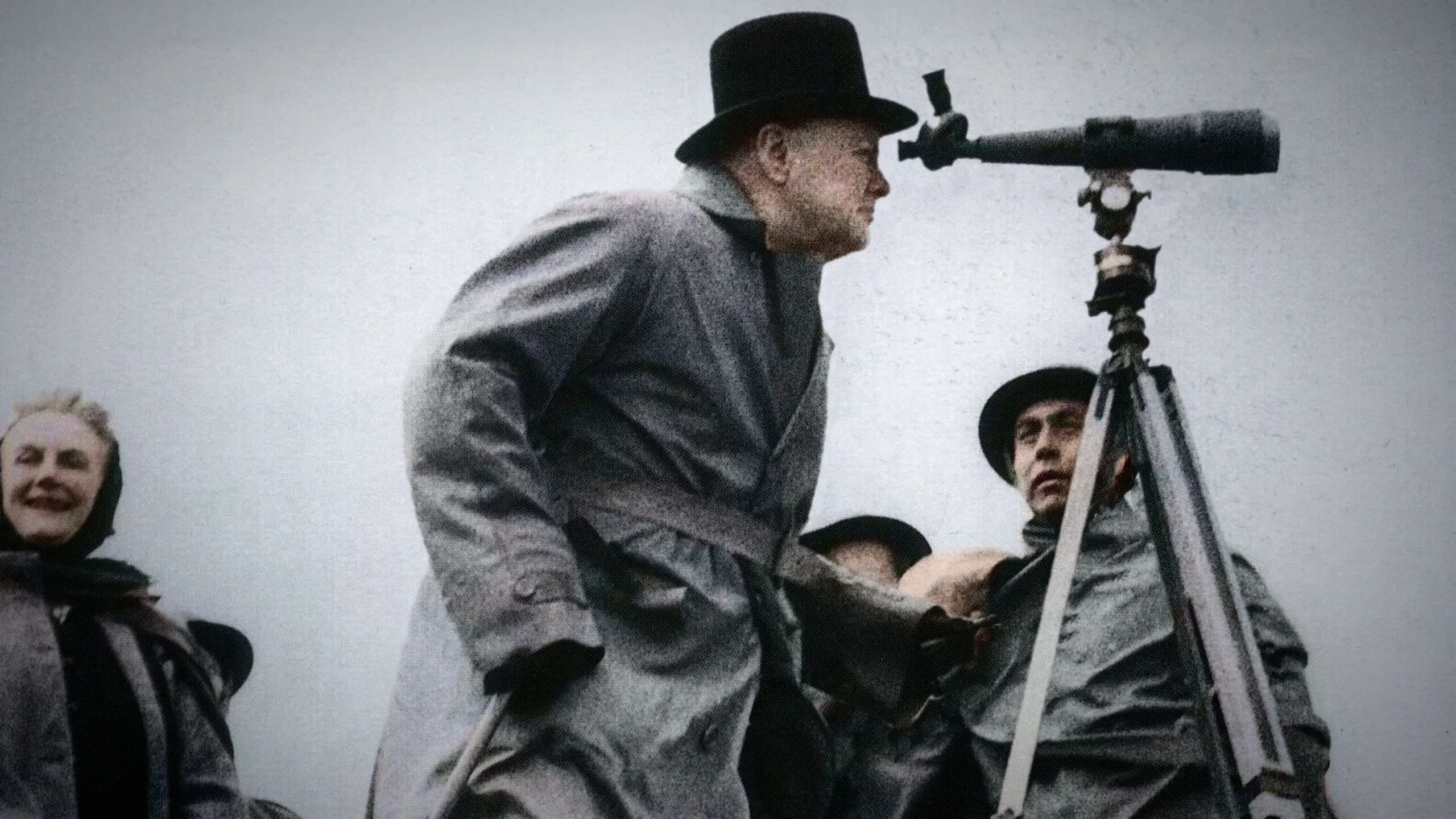“Churchill at War,” directed by Malcolm Venville, is a four-part documentary series attempting to uncover Winston Churchill’s complex involvement in World War II. Produced by Ron Howard and Brian Grazer, the series combines repaired and colourized historical material with AI-generated narrations of Churchill’s works. This ambitious combination invites viewers to navigate the turbulent waters of political intrigue and moral quandaries.
At its foundation, the documentary series seeks to shed light on one of Britain’s most renowned personalities. Churchill is shown as both a national hero and a contentious leader, exemplifying the contrasts of his era. His courageous stand against Nazi aggression is commendable. Still, his actions reflect a worrying disdain for human suffering, calling into doubt leadership ethics.
This series develops into more than just a historical account; it is a philosophical investigation into courage, ambition, and the moral compromises that leaders must navigate. Churchill’s legacy resonates today, sparking considerations on who we choose to venerate in our historical narratives, particularly in an era where authoritarianism offers a serious threat.
Structure and Content Overview
“Churchill at War” consists of four episodes, each precisely produced to chronicle Winston Churchill’s life and legacy. The series opens with Churchill’s early years, delving into his privileged upbringing and formative experiences that moulded his perspective.
The narrative follows his progression from a young man steeped in military tradition to a politician navigating the dangerous waters of British politics, setting the stage for his eventual elevation to Prime Minister during an extraordinary crisis. The episodes flow like a historical river, from his wilderness years (which sound more romantic than they are) to his furious leadership during world instability.
Significant wartime events are expertly weaved into the narrative tapestry, each serving as a dramatic turning point in Churchill’s career. The Blitz, for example, is portrayed not only as a series of bombings but also as a test of the British character.
Dunkirk is shown as a remarkable evacuation, capturing both despair and resilience—a testimony to the belief that survival might be enough of a victory. The Tehran Conference emerged as a watershed moment, illustrating shifting relationships and the difficulties of leadership, as Churchill found himself dealing not just with allies but also with his legacy.
The series adopts a striking visual style, using digitally colourized and repaired archive film to inject fresh life into history. While this technique is not revolutionary (to be honest, it’s become a bit of a trend), it enhances the watching experience by making the past feel immediate and visceral.
However, one can wonder if the emphasis on beauty often obscures the gravity of the events depicted. The AI-generated voiceovers add an unsettling yet intriguing element, generating a chilling resonance as Churchill recounts his history. However, does combining technology and nostalgia run the risk of commodifying a complex legacy? It’s an issue worth considering as we navigate the muddy waters of representation and memory.
Presentation and Style
“Churchill at War” combines a variety of unique and problematic narrative methods. The dramatic reenactments and AI-generated voiceovers of Churchill’s writings generate a distinct storytelling fabric that is both engaging and provocative.
The use of artificial intelligence to resuscitate Churchill’s voice is an intriguing (if little spooky) undertaking. It allows listeners to hear the Prime Minister’s remarks as he may have intended. However, one questions whether this technology improves our understanding of history or risks oversimplifying the man behind the myth.
The reenactments, which star actor Christian McKay offers a depth of drama that has been met with conflicting reactions. While some may find McKay’s portrayal appealing, there is an underlying tension between the gravity of historical events and the staged nature of these sequences.
They can feel like cinematic embellishments (think of them as the sprinkles on a serious cake) that, while visually pleasing, may detract from the documentary’s important themes. The audience must wonder whether such dramatization improves our understanding or detracts from the historical narrative.
The series is visually striking, with digitally restored and colourized material vividly depicting the past. The stylistic choices—bold colours and sharp imagery—allow viewers to feel the emotional weight of wartime Britain. However, one can wonder if the emphasis on visual attraction overshadows the conveyed dismal facts.
The sound design, accentuated by Churchill’s AI-generated voice, adds a frightening element but occasionally veers into the eerie. How do these choices impact how we perceive a historical figure who was a skilled orator and a damaged man? In this interaction of form and substance, “Churchill at War” invites viewers to confront the complexities of memory and representation.
Expert Insights and Commentary
“Churchill at War” has diverse voices, including former US President George W. Bush and Boris Johnson, the latter of whom is widely regarded as one of Churchill’s most fervent successors (though one may argue that the analogies are more hilarious). The involvement of such prominent figures surely lends gravity, but it also raises questions.
With Johnson—a leader frequently chastised for his own historical mistakes—offering insights into Churchill’s legacy, viewers may find themselves wrestling with the ancient adage that those who forget history are bound to repeat it (or, maybe, to be ridiculed in the process).
These experts’ insights are sometimes fascinating and sometimes baffling. Bush, for example, draws comparisons between Churchill’s fortitude during the Blitz and contemporary challenges faced by world leaders, implying that the essence of leadership has remained relatively constant.
These interviews include anecdotes that humanize Churchill, portraying him as a figure of intellect and bluster. While tinged with nostalgia, Johnson’s recollections frequently avoid the most difficult aspects of Churchill’s policy, particularly his imperialist tendencies and controversial decisions during the Bengal famine.
While the series strives for a balanced portrayal, it occasionally stumbles in its execution. The expert commentary ranges from respectful to critical. Still, the intricacies of Churchill’s legacy—his accomplishments and failures—are not always completely explored. This results in a simple dichotomy: Churchill is either an unwavering hero or a reckless imperialist.
Such simplicity is problematic, especially at a time when nuanced discourse is critical for understanding contemporary leadership. As viewers, we are left wondering if the series succeeds in presenting a truly multifaceted portrayal or succumbs to the lure of hagiography. In an age when historical personalities are being reevaluated, the lack of a deeper exploration into the complexities of Churchill’s decisions raises serious concerns about the narratives we support.
Thematic Exploration of Churchill
“Churchill at War” thoroughly examines Winston Churchill’s particular leadership style, which is defined by a mix of charisma and aggressiveness. His approach was less about reaching an agreement and more about fiery oratory and forceful action—a “my way or the highway” mentality that resonated at times of crisis.
The series shows how Churchill’s ability to unify the British people was both a blessing and a curse; At the same time, he inspired resilience in the face of Nazi attack; his preference for unilateral decision-making frequently alienated colleagues. The documentary raises an interesting question: can a leader’s efficacy be determined purely by their ability to inspire? Or should we consider the costs of their stubbornness?
However, the series does not shy away from presenting Churchill’s contentious sides, particularly his imperialist ideals and decisions, which have stained his reputation. His opposition to Indian independence and his infamous refusal to send relief during the Bengal famine paint a more nuanced portrait of the man many admire.
These characteristics are a cautionary story about great leaders’ dual roles: saviours and tyrants. The documentary challenges viewers to reconcile Churchill’s indisputable contributions to the war effort with the moral flaws that complicate his legacy. This process is both challenging and vital in today’s reevaluating historical figures.
Churchill’s personality qualities are strongly portrayed throughout the series. His magnetism, described as captivating, entices people, yet his stubbornness may be a double-edged sword. The portrayal of Churchill as a man who wrote letters from the bathtub (both humorous and ludicrous) emphasizes his quirkiness.
While charming to some, this combination of intellect and quirk raises issues about the nature of leadership itself: do a leader’s eccentricities make them approachable, or do they detract from their power? As viewers, we are encouraged to consider the complexities of human nature, particularly in those with tremendous power. In addressing these characteristics, the docuseries offers a nuanced exploration of what it means to lead—and the inherent conflicts that come with it.
Historical Context and Legacy
“Churchill at War” situates its subject within the larger political climate of the early twentieth century, an era of upheaval and transition. The growth of fascism in Europe and the threat of global war influenced Churchill’s actions and speech.
His vehement resistance to appeasement during Neville Chamberlain’s leadership is portrayed not only as a personal conviction but also as a reaction to a world on the verge of anarchy. The docuseries conveys the real tension of the time—a period when hesitation may lead to disaster. This backdrop invites viewers to explore how leadership demands influence decision-making, which frequently forces leaders into morally problematic areas.
However, the series also examines the irony of Churchill’s postwar decline. Despite his critical role in winning the war, he was unceremoniously thrown out of office in 1945, opening the way for Clement Attlee and the Labour government.
This twist of fate emphasizes an important point: public affection for a wartime leader does not ensure postwar popularity. Churchill’s vision for Britain contrasted with the public’s yearning for social transformation and a fresh start. The docuseries delves into this duality, implying the transitory nature of political capital and the complexities of public perception—a reminder that history frequently condemns leaders based on their deeds in times of peace and war.
Churchill’s legacy, as depicted in the series, remains a two-edged sword. On the one hand, he is seen as a staunch supporter of democracy; on the other, his imperialist views and contentious actions create troubling questions about the moral significance of his legacy.
The series adds to the continuing discussion about historical relevance by encouraging viewers to consider that legacy is not a single construct but a mosaic of successes and failures. In an age where leaders are judged on past and present values, “Churchill at War” is an important exploration of how we choose to remember—and sometimes forget—historical individuals.
Conclusion and Final Thoughts
“Churchill at War” is a riveting, if occasionally imperfect, depiction of one of history’s most complicated characters. The series stands out because it utilizes visually striking historical material and creatively incorporates AI-generated voiceovers, which bring Churchill’s remarks to life.
However, while the dramatic reenactments are designed to increase participation, they occasionally veer into melodrama, raising issues about usefulness. The mix of expert viewpoints provides useful insights. Still, it occasionally lacks depth, leaving viewers wanting a more nuanced exploration of Churchill’s paradoxes.
This docuseries will certainly resonate with history buffs and casual viewers, especially those interested in leadership, resilience, and the moral quandaries of powerful characters. As a historical source, it provides a clear entry point into Churchill’s life, stimulating contemplation on the complexities of wartime leadership. However, those looking to dig deeper into the more difficult aspects of his legacy may be disappointed.
Understanding leaders like Churchill is becoming increasingly important in an era of political divisiveness and the reevaluation of historical narratives. The series challenges us to confront not only former leaders’ successes but also their flaws and legacy. As we navigate our volatile times, “Churchill at War” reminds us that history is rarely black and white, but rather a beautiful tapestry of gray.
The Review
Churchill at War
"Churchill at War" visually explores Winston Churchill’s complex legacy, blending archival footage with innovative narrative techniques. While it effectively highlights his leadership during World War II, the series occasionally falters in its dramatizations and depth of analysis, leaving certain controversial aspects underexplored. Nonetheless, it serves as a compelling introduction to Churchill's life and the moral ambiguities of leadership. This docuseries is worth a watch for viewers seeking both historical insight and a reminder of the complexities of human character.
PROS
- Visually stunning with restored and colorized archival footage.
- Innovative use of AI-generated voiceovers adds a unique narrative layer.
- Engaging portrayal of Churchill’s leadership during World War II.
- Features a diverse range of expert opinions, including notable figures.
CONS
- Dramatized reenactments can feel melodramatic and detract from the narrative.
- Some controversial aspects of Churchill's legacy are underexplored.
- The balance of expert commentary lacks depth at times.
- May oversimplify complex historical themes.









































